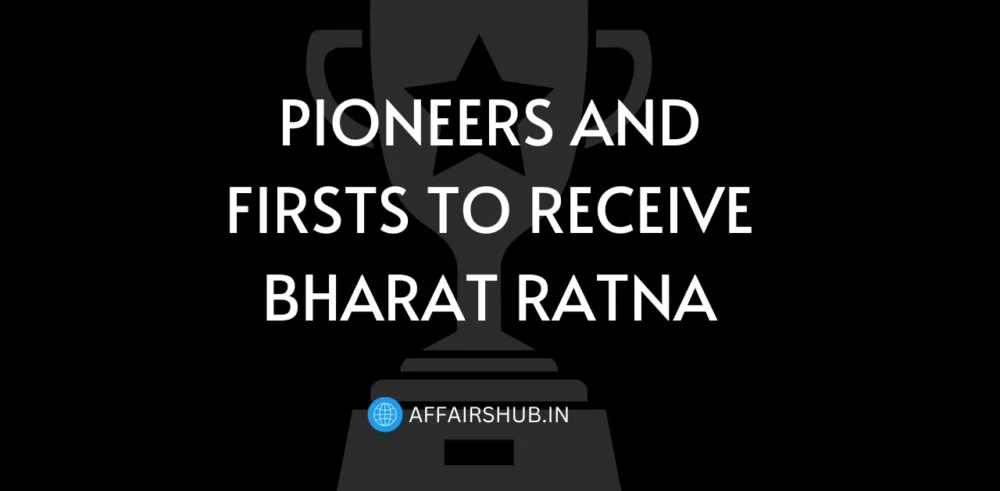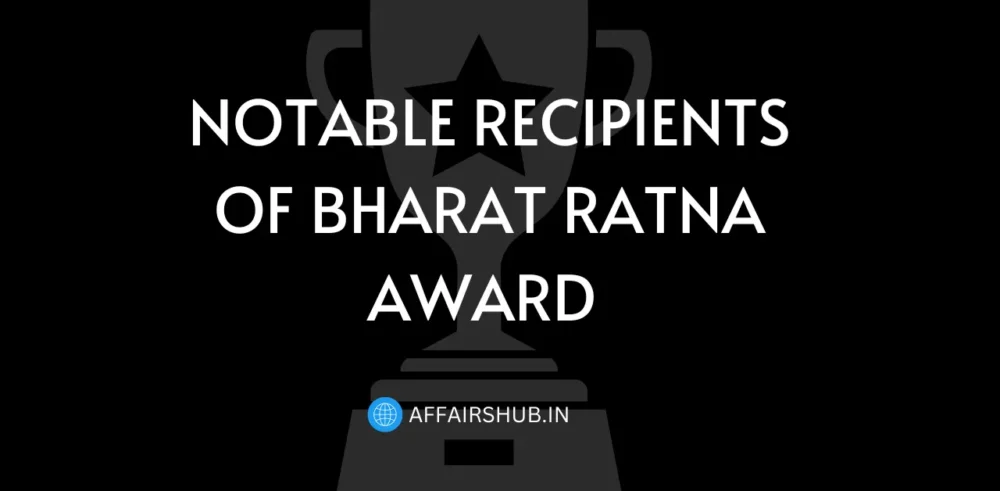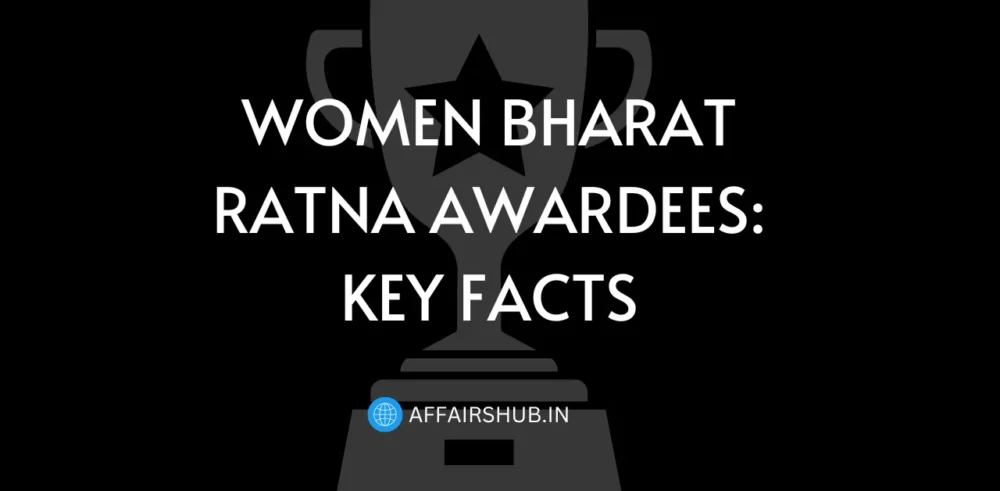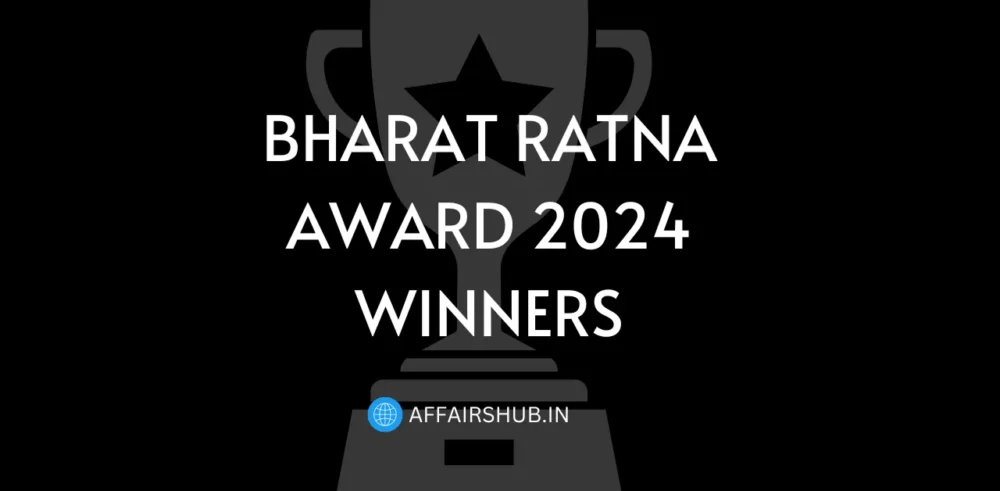The Bharat Ratna Award, initiated in 1954, is India’s highest civilian honour. It is bestowed upon individuals who exhibit exceptional contributions in public service, literature, science, art, or various human endeavours.
Maximum Awardee
- A maximum of three individuals can receive this esteemed award in a single year. Importantly, the selection process ensures no discrimination based on caste, creed, occupation, religion, language, or gender.
- In 2024, a historic milestone was achieved with the Bharat Ratna award being conferred upon five individuals, marking the highest number in a year.
- This surpasses the previous record set in 1999 when four individuals were honoured with this prestigious award.
Number of Awardee
A total of 53 individuals have been conferred the Bharat Ratna award until 2024, with an additional 5 individuals receiving the honour in the year 2024.
Here, we present the comprehensive list of Bharat Ratna Award winners from 1954 to 2024, along with key highlights of their noteworthy contributions.
Who Got Bharat Ratna Award List From 1954 to 2024
Here, we present the comprehensive list of individuals honoured with the Bharat Ratna Award. The star (⭐) denotes posthumous recipients. Notably, the years 2021 and 2022 saw no Bharat Ratna awards.
| List of Bharat Ratna Awardees | |||
|---|---|---|---|
| Recipients (State/UT) | Year | States | Key Notes |
| C. Rajagopalachari/ Rajaji | 1954 | Tamil Nadu | • C. Rajagopalachari, known as the “Mootharignar” (“Scholar Emeritus”). • Last Governor-General of India. • Founder of the Swatantra Party. • Conscience keeper of M.K. Gandhi. • Home minister in Nehru’s first cabinet. • First governor of West Bengal. • Chief minister of Tamil Nadu for over two years, between 1952 and 1954. |
| Sarvapalli Radhakrishnan | 1954 | Tamil Nadu | • Sarvepalli Radhakrishnan, philosopher. • Served as India’s first Vice-President (1952–62) and second President (1962–67). • His birthday on 5 September is observed as “Teachers’ Day” in India. |
| C. V. Raman | 1954 | Tamil Nadu | • C.V. Raman, widely known for his work on the scattering of light and the discovery of the effect, better known as “Raman scattering”. • Mainly worked in the field of atomic physics and electromagnetism. • Awarded the Nobel Prize in Physics in 1930. |
| Bhagwan Das | 1955 | Uttar Pradesh | • Bhagwan Das, independence activist, philosopher, and educationist. • Co-founder of Mahatma Gandhi Kashi Vidyapith. • Worked with Madan Mohan Malaviya for the foundation of Banaras Hindu University. |
| M. Visvesvaraya | 1955 | Karnataka | • M. Visvesvaraya, civil engineer, statesman, and Diwan of Mysore (1912–18). • Knight Commander of the Order of the Indian Empire. • His birthday, 15 September, is observed as “Engineer’s Day” in India. |
| Jawaharlal Nehru | 1955 | Uttar Pradesh | • Jawaharlal Nehru, independence activist and author. • First and longest-serving Prime Minister of India (1947–64). • Nehru himself was Prime Minister of India at the time of receiving the award. |
| Govind Ballabh Pant | 1957 | Uttarakhand | • Govind Ballabh Pant, independence activist Premier of United Provinces (1937–39, 1946–50). • First Chief Minister of Uttar Pradesh (1950–54). • Served as Union Home Minister from 1955 to 1961. |
| Dhondo Keshav Karve | 1958 | Maharashtra | • Dhondo Keshav Karve, social reformer, and educator. • Widely known for his works related to women’s education and the remarriage of Hindu widows. • Established the Widow Marriage Association (1883). • Founded Hindu Widows Home (1896). • Started Shreemati Nathibai Damodar Thackersey Women’s University in 1916. |
| Bidhan Chandra Roy | 1961 | West Bengal | • Bidhan Chandra Roy, physician, political leader, philanthropist, educationist, and social worker. • Often considered the “Maker of Modern West Bengal”. • Second Chief Minister of West Bengal (1948–62). • His birthday on 1 July is observed as National Doctors’ Day in India. |
| Purushottam Das Tandon | 1961 | Uttar Pradesh | • Rajarshi Purushottam Das Tandon Independence activist. • Served as the speaker of the Uttar Pradesh Legislative Assembly (1937–50). • Actively involved in a campaign to get official language status for Hindi. • Often titled as “Rajarshi” |
| Rajendra Prasad | 1962 | Bihar | • Rajendra Prasad, independence activist, lawyer, statesman, and scholar. • Closely associated with Mahatma Gandhi in the Champaran Satyagraha in Bihar and the non-cooperation movement for Indian independence. • Became the President of the Constituent Assembly of India. • Later elected as the first President of India (1950–62). |
| Zakir Husain | 1963 | Andhra Pradesh | • Zakir Husain, independence activist and education philosopher. • Served as Vice Chancellor of Aligarh Muslim University (1948–56). • Governor of Bihar (1957–62). • Elected as the second Vice President of India (1962–67). • Became the third President of India (1967–69). |
| Pandurang Vaman Kane | 1963 | Maharashtra | • Indologist and Sanskrit scholar, Kane. • Best known for his five-volume literary work, “History of Dharmaśāstra: Ancient and Medieval Religious and Civil Law in India”. • The “monumental” work extends over nearly 6,500 pages and was published from 1930 to 1962. |
| Lal Bahadur Shastri ⭐ | 1966 | Uttar Pradesh | • Lal Bahadur Shastri, known for the slogan “Jai Jawan Jai Kisan” (“Hail to the Soldier, hail to the Farmer”). • Independence activist. • Served as the second Prime Minister of India (1964–66). • Led the country during the Indo-Pakistani War of 1965. |
| Indira Gandhi | 1971 | Uttar Pradesh | • Indira Gandhi, known as the “Iron Lady of India”. • Prime Minister of India during 1966–77 and 1980–84. • During the Indo-Pakistani War of 1971, her government supported the Bangladesh Liberation War, leading to the formation of Bangladesh. • Gandhi herself was Prime Minister of India at the time of receiving the award. |
| V. V. Giri | 1975 | Odisha | • V. V. Giri, while studying at the University College Dublin, was involved in the Irish Sinn Féin movement. • Upon returning to India, organized trade unions and engaged them in the Indian freedom struggle. • Post-independence, held positions of Governor of Uttar Pradesh, Kerala, and Mysore. • Also served in various other cabinet ministries. • Became the first acting president and eventually elected as the fourth President of India (1969–74). |
| K. Kamaraj ⭐ | 1976 | Tamil Nadu | • K. Kamaraj, known as the “King Maker”. • Instrumental in making Lal Bahadur Shastri and Indira Gandhi Prime Ministers of India. • Chief Minister of Tamil Nadu for over nine years, between 1954 and 1963. • Founder of the Indian political party, the Indian National Congress (Organisation). |
| Mother Teresa | 1980 | West Bengal, born in North Macedonia | • Mother Teresa, “Saint Mother Teresa of Calcutta”. •Catholic nun and founder of the Missionaries of Charity. • The congregation manages homes for individuals with HIV/AIDS, leprosy, and tuberculosis. • Awarded the Nobel Peace Prize in 1979 for humanitarian work. • Beatified on 19 October 2003 by Pope John Paul II. • Canonized on 4 September 2016 by Pope Francis. |
| Vinoba Bhave | 1983 | Maharashtra | • Vinoba Bhave, independence activist, social reformer. • Close associate of Mahatma Gandhi. • Best known for the Bhoodan movement, “Land-Gift Movement”. • Given the honorific title “Acharya” (“teacher”). • Awarded the Ramon Magsaysay Award in 1958 for his humanitarian work. |
| Khan Abdul Ghaffar Khan | 1987 | Pakistan | • Khan Abdul Ghaffar Khan, widely known as “Frontier Gandhi”. • Independence activist and Pashtun leader. • Follower of Mahatma Gandhi. • Joined the Khilafat Movement in 1920. • Founded Khudai Khidmatgar (“Red Shirt movement”) in 1929 |
| M. G. Ramachandran ⭐ | 1988 | Tamil Nadu | • M.G. Ramachandran, known as the “Puratchi Thalaivar” (“Revolutionary Leader”). • Actor-turned-politician. • First actor to become the chief minister of a state in the history of India. • Chief minister of Tamil Nadu for over ten years, between 1977 and 1987. • Founder of the Indian political party, All India Anna Dravida Munnetra Kazhagam (AIADMK). |
| B.R. Ambedkar ⭐ | 1990 | Maharashtra | • B.R. Ambedkar, social reformer, and leader of the Dalits. • Headed the committee drafting the Indian Constitution. • Served as the first Law Minister of India. • Predominantly campaigned against social discrimination against Dalits and the caste system. • Associated with the Dalit Buddhist movement. • Accepted Buddhism as a religion along with his close to half a million followers on 14 October 1956. |
| Nelson Mandela | 1990 | South Africa | • Nelson Mandela, leader of the Anti-Apartheid Movement in South Africa Served as the President of South Africa from 1994 to 1999. • Often referred to as the “Gandhi of South Africa”. • Mandela’s African National Congress movement was influenced by Gandhian philosophy. • Awarded the Nobel Peace Prize in 1993 |
| Rajiv Gandhi ⭐ | 1991 | Uttar Pradesh | • Rajiv Gandhi, sixth Prime Minister of India (1984–1989). • Elected as the youngest Prime Minister in 1984 at the age of 40. • During his tenure, landmark laws were passed, including the Anti-defection law in 1985. |
| Vallabhbhai Patel ⭐ | 1991 | Gujarat | • Sardar Patel, widely known as the “Iron Man of India”. • Independence activist and the first Deputy Prime Minister of India (1947–50). • Post-independence, worked with V. P. Menon towards dissolving 555 princely states into the Indian union. |
| Morarji Desai | 1991 | Gujarat | • Independence activist Desai. • Fourth Prime Minister of India (1977–79). • One of the three Indian nationals awarded the Nishan-e-Pakistan, the second-highest civilian award given by the Government of Pakistan. • Others being Neerja Bhanot and Syed Ali Shah Gilani. • First Prime Minister of India not from the Indian National Congress |
| Abul Kalam Azad ⭐ | 1992 | West Bengal | • Maulana Azad, independence activist. • India’s first Minister of Education. • Worked towards free primary education. • Widely known as “Maulana Azad”. • His birthday on 11 November is observed as National Education Day in India. |
| J. R. D. Tata | 1992 | Maharashtra | • J.R.D. Tata, industrialist, philanthropist, and aviation pioneer. • Founder of India’s first airline, Air India. • Founder of various institutes, including: Tata Institute of Fundamental Research, Tata Memorial Hospital, Tata Institute of Social Sciences, Tata Motors, Tata Consultancy Services (TCS), National Institute of Advanced Studies, National Centre for the Performing Arts |
| Satyajit Ray | 1992 | West Bengal | • Film-maker Ray debuted with Pather Panchali in 1955. • Credited with bringing world recognition to Indian cinema. • Awarded the Dadasaheb Phalke Award in 1984, India’s highest award in cinema. • Received Academy Honorary Award in 1991 |
| Gulzarilal Nanda | 1997 | Punjab | • Independence activist Nanda. • Two-time interim Prime Minister of India (1964, 1966). • Two-time deputy chairman of the Planning Commission. |
| Aruna Asaf Ali ⭐ | 1997 | West Bengal | • Independence activist Ali. • Known for hoisting the Indian flag in Bombay during the Quit India Movement in 1942. • Post-Independence, elected as Delhi’s first mayor in 1958. |
| A.P.J Abdul Kalam | 1997 | Tamil Nadu | • A.P.J. Abdul Kalam, aerospace and defense scientist. • Involved in the development of India’s first satellite launch vehicle SLV III. • Architect of the Integrated Guided Missile Development Program. • Worked for the Indian National Committee for Space Research, Indian Space Research Organisation, Defence Research and Development Laboratory. • Appointed as the Scientific Advisor to the Defence Minister, Secretary to the Department of Defence Research and Development, and Director-General of Defence Research and Development Organisation. • Served as the eleventh President of India from 2002 until 2007. |
| M. S. Subbulakshmi | 1998 | Tamil Nadu | • M.S. Subbulakshmi, Carnatic classical vocalist from Madurai, Tamil Nadu. • Known for her divine voice, often hailed as the “Queen of songs”. • First Indian musician to receive the Ramon Magsaysay award for public service. • Honored as a resident artist Aasthana Vidwan of Tirumala Tirupati Devasthanam. • Bronze statue installed in Tirupati by Tirupati Urban Development Authority (TUDA). • Famous renditions include chanting of Bhaja Govindam, Vishnu Sahasranamam, Hari Tuma Haro, Venkateswara Suprabhatam, Annamacharya Sankirtanas, and Tamil Tevaram. • Acted in a few Tamil films from 1938 to 1947. • Donated royalties from best-selling records to charity organizations |
| Chidambaram Subramaniam | 1998 | Tamil Nadu | • C. Subramaniam, independence activist. • Former Minister of Agriculture of India (1964–66). • Known for his contribution towards the Green Revolution in India. • Worked for the International Rice Research Institute, Manila, during the late 1970s. • Also worked for the International Maize and Wheat Research Institute, in Mexico. |
| Jayaprakash Narayan ⭐ | 1999 | Bihar | • Jayaprakash Narayan, independence activist, social reformer. • Commonly referred to as “Loknayak” (“People’s Leader”). • Known for “Total Revolution Movement” or “JP Movement”. • Initiated during the mid-1970s, Aimed to “overthrow the corrupt and exploitative Congress government”. |
| Amartya Sen | 1999 | West Bengal | • Amartya Sen, winner of the Nobel Memorial Prize in Economic Sciences (1998). • Conducted research over various topics, including: Social choice theory, Ethics and political philosophy, Welfare economics, Decision theory, Development economics, Public health, Gender studies |
| Gopinath Bordoloi ⭐ | 1999 | Assam | • Independence activist Bordoloi, first Chief Minister of Assam (1946–50). • Efforts and association with Minister of Home Affairs Vallabhbhai Patel widely acknowledged. • Played a crucial role in keeping Assam united with India, especially when parts of it were to merge with East Pakistan. |
| Ravi Shankar | 1999 | Uttar Pradesh | • Ravi Shankar, sitar player. • Winner of four Grammy Awards. • Often considered “the world’s best-known exponent of Hindustani classical music”. • Known for collaborative work with Western musicians, including Yehudi Menuhin and George Harrison. |
| Lata Mangeshkar | 2001 | Maharashtra | • Lata Mangeshkar, widely credited as the “nightingale of India”. • Playback singer, started her career in the 1940s. • Sang songs in over 36 languages. • Awarded the Dadasaheb Phalke Award in 1989, India’s highest award in cinema. |
| Bismillah Khan | 2001 | Uttar Pradesh | • Bismillah Khan, Hindustani classical shehnai player. • Played the shehnai for more than eight decades. • Credited with bringing the shehnai to the center stage of Indian music. • Celebrated for highlighting the shehnai in Indian music. • Third classical musician to receive the Bharat Ratna Award. |
| Bhimsen Joshi | 2009 | Karnataka | • Bhimsen Joshi, Hindustani classical vocalist from Karnataka. • Disciple of Kirana gharana, an Indian musical school. • Widely known for the Khyal genre of singing. • Recognized for his “mastery over rhythm and accurate notes”. |
| C. N. R. Rao | 2014 | Karnataka | • Chemist and professor Rao, recipient of Honorary Doctorates from 63 Universities. • Honorary Doctorates include Purdue, IIT Bombay, and Oxford. • Worked prominently in the fields of: Solid State and Materials Chemistry, Spectroscopy, Molecular Structure. • Authored around 1600 research papers. |
| Sachin Tendulkar | 2014 | Maharashtra | • Sachin Tendulkar, debuted in 1989. • Played 664 international cricket matches. • Career spanned over two decades. • Only player to score one hundred international centuries. • First batsman to score a double century in a One Day International. • Only player to complete more than 34,000 runs in both ODI and Test cricket. |
| Madan Mohan Malaviya ⭐ | 2015 | Uttar Pradesh | • Malaviya, scholar, and educational reformer. • Founder of Akhil Bharatiya Hindu Mahasabha in 1906. • Founder of Banaras Hindu University. • Served as the university’s vice-chancellor from 1919 to 1938. • President of the Indian National Congress for four terms. • Chairman of Hindustan Times from 1924 to 1946. • He is recognized as the Mahamana. |
| Atal Bihari Bajpayee | 2015 | Madhya Pradesh | • Atal Bihari Vajpayee, parliamentarian for over four decades. • Elected nine times to the Lok Sabha. • Elected twice to the Rajya Sabha. • Served as the Prime Minister of India for three terms: 1996, 1998, 1999–2004. • Minister of External Affairs during 1977–79. • Awarded “Best Parliamentarian” in 1994 |
| Pranab Mukherjee | 2019 | West Bengal | • Pranab Mukherjee, an Indian politician • 13th President of India (2012–2017). • Political career of five decades. • Senior leader in the Indian National Congress. • Held several ministerial portfolios in the Government of India. • Union Finance Minister from 2009 to 2012 before becoming President. |
| Nanaji Deshmukh ⭐ | 2019 | Maharashtra | • Chandikadas Amritrao Deshmukh, aka Nanaji Deshmukh (11 October 1916 – 27 February 2010). • Indian social activist. • Contributions in the fields of education, health, and rural self-reliance. • Leader of the Bharatiya Jana Sangh. • Member of the Rajya Sabha |
| Bhupen Hazarika ⭐ | 2019 | Assam | • Indian playback singer, lyricist, musician, poet, and filmmaker from Assam. • Widely known as Sudhakantha Songs written and sung mainly in the Assamese language. • Themes of humanity and universal brotherhood in his songs Translated and sung in various languages, notably Bengali and Hindi. |
| Karpoori Thakur ⭐ | 2024 | Bihar | • Indian politician served two terms as the 11th Chief Minister of Bihar. • Introduced a 26% reservation model in Bihar in 1978. • He was popularly known as Jan Nayak (transl. people’s hero). |
| M. S. Swaminathan⭐ | 2024 | Tamil Nadu | • Indian agronomist, geneticist, and administrator. • Globally recognized as a leader of the green revolution in India. • Known for leadership and crucial role in introducing and advancing high-yielding varieties of wheat and rice. |
| Chaudhary Charan Singh ⭐ | 2024 | Uttar Pradesh | • Indian politician and independence activist. • Served as the 5th Prime Minister of India from 1979 to 1980. • Known as the “Champion of India’s peasants.” • Founder of the political party Lokdal in 1980. |
| P. V. Narasimha Rao⭐ | 2024 | Delhi | • Indian lawyer and politician. • Served as the 9th Prime Minister of India from 1991 to 1996. • First Prime Minister from South India. • Known for introducing various liberal reforms to India’s economy. |
| L.K. Advani | 2024 | Delhi | • Politician and co-founder of the Bharatiya Janata Party (BJP). • Served as the 7th Deputy Prime Minister of India from 2002 to 2004. • Longest-serving Leader of the Opposition in the Lok Sabha. |
Bharat Ratna Award: Recognizing Excellence in Service and Achievement
Initiation and Purpose
The Bharat Ratna Award, established in 1954, is the highest civilian honour in India. It acknowledges individuals for their outstanding contributions to public service, literature, science, art, or various human endeavours. The Prime Minister of India makes the recommendations for this prestigious award.
Conferment by the President
The President of India officially conferred the award, adding a touch of national significance to the recognition. To date, 48 distinguished individuals have been honoured with the Bharat Ratna Award.
Posthumous Recognition
Notably, the Bharat Ratna can also be awarded posthumously, reflecting the enduring impact of individuals even after their passing. Fourteen eminent personalities have received this recognition posthumously.
Constitutional Guidelines
Article 18 (1) of the Indian Constitution states that the state can confer no titles, including military or academic distinctions. Additionally, awardees are prohibited from using Bharat Ratna as a prefix or suffix to their names, ensuring equality and impartiality.
Non-Monetary Recognition
Unlike some awards, Bharat Ratna does not come with any monetary grants. Instead, recipients receive a Certificate/Sanad signed by the current President of India, highlighting the honour and recognition bestowed upon them.
Symbolic Medal Design
The recipients are presented with a distinctive medal shaped like a peepal leaf, featuring India’s state emblem and the inspiring inscription “Satyamev Jayate.” This unique design adds a symbolic touch to the recognition, underscoring the values and principles the award upholds.
Bharat Ratna: Intriguing Nomination Stories and Notable Absences
Controversial Nomination: Subhash Chandra Bose (1992)
In 1992, the Government of India made a groundbreaking decision to present the Bharat Ratna Award to Subhash Chandra Bose posthumously. However, his family members and supporters, sceptical about his reported demise, vehemently opposed the move, creating a unique and controversial chapter in the history of Bharat Ratna nominations.
Unfulfilled Hopes: Major Dhyanchand and the Magician of Hockey
Major Dhyanchand, often hailed as the “Magician of Hockey,” has been a recurring name in discussions with Bharat Ratna. Despite his extraordinary contributions to Indian sports, the coveted award has eluded him thus far, sparking conversations about the criteria and considerations involved in the selection process.
Exploring Controversies and Aspirations
While symbolizing the pinnacle of recognition, the Bharat Ratna Award has not been without its share of controversies and unfulfilled aspirations. These stories add layers to the rich tapestry of India’s highest civilian honour, reflecting the complexities of acknowledging and celebrating exceptional contributions.
First Three Bharat Ratna Award Winners
1954: The Birth of Bharat Ratna
The prestigious Bharat Ratna Awards made their debut in 1954, ushering in an era of recognition for exemplary service. The first recipients from Tamil Nadu laid the foundation for this esteemed honour.
Trailblazing Trio from Tamil Nadu
The initial triumvirate of Bharat Ratna awardees comprised C. Rajagopalachari, C. V. Raman, and S. Radhakrishnan, representing the vibrant talent of Tamil Nadu. This marked the beginning of a tradition that celebrated diverse accomplishments.
Individual Profiles
C. Rajagopalachari: Activist, Statesman, Lawyer
C. Rajagopalachari, a multifaceted personality, distinguished himself as an activist, statesman, and lawyer. His contributions resonated beyond legal realms, leaving an indelible mark on India’s socio-political landscape.
Dr Sarvapalli Radhakrishnan: Vice-President to President
Dr. Sarvapalli Radhakrishnan, the first Vice-President and second President of India, brought intellectual prowess to the highest echelons of governance. His leadership and philosophical insights left an enduring impact.
C. V. Raman: Pioneer in Physics
C. V. Raman, a luminary in the scientific realm, excelled as a physicist, mathematician, and scientist. His groundbreaking work, particularly in Raman Scattering, etched his name in history. Notably, he became the first Asian scientist to be honoured with a Nobel Prize in any scientific discipline.
✅ Also Read: Pioneers and Firsts to Receive Bharat Ratna, India’s Highest Civilian Honor
Legacy of Achievements
Through their diverse expertise, C. Rajagopalachari, Dr. Sarvapalli Radhakrishnan, and C. V. Raman set a high standard for Bharat Ratna recipients, embodying the spirit of excellence and innovation.
Scientific Milestone
C. V. Raman’s Nobel Triumph
C. V. Raman’s distinction as the first Asian scientist to receive a Nobel Prize in science, a testament to his profound contributions, particularly in physics, added a significant chapter to India’s scientific legacy.
The inaugural Bharat Ratna ceremony recognised exceptional individuals and laid the groundwork for future honorees. With their diverse contributions, C. Rajagopalachari, Dr. Sarvapalli Radhakrishnan, and C. V. Raman set a precedent for the esteemed recipients who would follow in their illustrious footsteps.
FAQs Related to Bharat Ratna Award
Nanaji Deshmukh, Pranab Mukherjee, and Bhupen Hazarika were the recipients of the Bharat Ratna award in 2019.
A maximum of three Bharat Ratna awards can be conferred each year.
Lal Bahadur Shastri became the first posthumous recipient of the Bharat Ratna award.
The Bharat Ratna Award was introduced in 1954.
C.V. Raman was the first-ever recipient of the Bharat Ratna Award, recognised for his scientific contributions.
Source:
Explore More Topics Related to Bharat Ratna:




